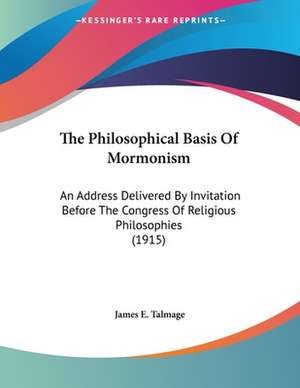The Philosophical Basis Of Mormonism
Autor James E. Talmageen Limba Engleză Paperback – 13 apr 2009
Preț: 148.30 lei
Nou
Puncte Express: 222
Preț estimativ în valută:
28.39€ • 30.84$ • 23.86£
28.39€ • 30.84$ • 23.86£
Carte tipărită la comandă
Livrare economică 17-23 aprilie
Preluare comenzi: 021 569.72.76
Specificații
ISBN-13: 9781104321055
ISBN-10: 110432105X
Pagini: 36
Dimensiuni: 216 x 280 x 3 mm
Greutate: 0.16 kg
Editura: Kessinger Publishing
ISBN-10: 110432105X
Pagini: 36
Dimensiuni: 216 x 280 x 3 mm
Greutate: 0.16 kg
Editura: Kessinger Publishing
Notă biografică
James Edward Talmage (21 September 1862 - 27 July 1933) was an English chemist, geologist, and religious leader who served as a member of the Quorum of the Twelve Apostles of The Church of Jesus Christ of Latter-day Saints (LDS Church) from 1911 until his death. A professor at Brigham Young Academy (BYA) and University of Utah (U of U), Talmage also served as president of the U of U and Latter-day Saints' University. In addition to his academic career, Talmage authored several religious-themed books, the most prominent of which are Jesus the Christ and Articles of Faith. Despite first being published in 1915 and 1899, the books remain classics in Mormon literature. An academic and religious scholar, Talmage did not believe that science conflicted with his religious views. Regarding the conflicting Mormon views on evolution, Talmage attempted to be a mediator between church leaders B.H. Roberts and Joseph Fielding Smith who disagreed about evolution and the origin of man. In addition to his academic and religious involvement, Talmage was involved in local political leadership in Provo as a city council member, alderman, and justice of the peace Talmage was an attentive student and teacher of science, but he did not believe there was conflict between science and religion and did not worry about differences or discrepancies between the two fields of thought. He believed that with time and continued learning, these discrepancies would eventually be resolved.[5]:231-233 He had confidence in the scientific method and was able to accept scientific discoveries and findings supported by it while still holding fast to his religious beliefs. His views on science and religion are demonstrated by this statement: "Within the Gospel of Jesus Christ there is room for every truth thus far learned by man, or yet to be made known."[32] Talmage's views on science and religion can also be seen through an event that took place in 1929. In that year, B.H. Roberts, a scientific scholar and LDS Church leader, presented a 700-page manuscript to the First Presidency which attempted to completely align theology and science. Other church leaders were concerned with what was written in this manuscript and disagreed with the claims about evolution represented. Joseph Fielding Smith, then a member of the Quorum of the Twelve Apostles, made a statement against what was written about evolution in the manuscript prepared by Roberts. Talmage tried to mediate between Smith and Roberts, suggesting to the First Presidency that they come out with a statement of neutrality on the issue, which they did. They soon came out with a statement stating that neither side of the argument was accepted as church doctrine.
